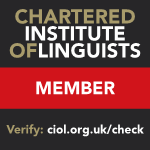How can a qualified translator add value to your organisation?
- Alicja Tokarska
- Mar 14, 2023
- 3 min read
If you’re in need of a translation service, hiring the right person for the job is key. The quality of translation will determine the success of your product in a new market. Sleek, polished text will also help you communicate with a foreign-language local community that needs your service.
You might have noticed that quite a few translators share the same post nominals, like MITI or MCIL. These are not just random letters – they certify that these people are qualified and experienced translators.
Translation post-nominals explained
In the UK, there are two professional bodies for translators and interpreters: Institute of Translation and Interpreting (ITI) and Chartered Institute of Linguists (CIOL). Each of these institutions has different levels of membership. Here’s a short introduction to all the categories:
AITI – Associate Member of ITI
Translator or interpreter with at least one year of professional experience
MITI – Qualified Member of ITI
Translator or interpreter with at least three years’ professional experience, who has an established career and is recognised for their expertise as a highly skilled professional
FITI – Fellow of ITI
Professional with at least ten years’ membership of ITI and significant achievement within the industry
ACIL – Associate of CIOL
Linguist with at least one year's work experience in a language-related field
MCIL – full Member of CIOL
Linguist with a degree level (or higher) qualification in their non-native language and a minimum of three years' experience, or five years’ professional experience
FCIL – Fellow of CIOL
Linguist with an advanced professional standing, often with a distinguished service to languages
Bonus: CL – Chartered Linguist
Full and Fellow Members of CIOL can also apply to become Chartered Linguists. It is a mark of quality and competence, and shows one’s commitment to maintaining high professional standards.

How easy is it to become a member of CIOL or ITI?
Both ITI and CIOL are also open to establishing linguists and students, but becoming an Associate, a full Member or a Qualified member isn’t a walk in the park. To be admitted onto these levels, the candidate needs to provide professional references, proof of education and – in the case of MITI – pass a professional qualification assessment. Alternatively, they must have finished their Master’s degree with Merit or Distinction, or hold a Level 7 DipTrans (more information can be found on the ITI and CIOL websites).
Code of Conduct
Members of the two professional bodies are also bound by codes of conduct. These documents cover a variety of standards, such as professional competences, responsibility for one’s work, and continuous professional development.
Hiring a translator who is bound by a code of conduct means a peace of mind for clients – there are specific procedures in place for complaints or unprofessional behaviour.
Continuous professional development
Both ITI and CIOL require their members to keep a log of their continuous professional development (CPD) – that is any courses, webinars, conferences and other educational activities the linguist attends. The recommended minimum number of CPD hours is 30, but many translators and interpreters well exceed that number.
Why is it beneficial to work with a translator who takes their CPD seriously? It means that your linguist pays close attention to what’s going on in their area(s) of expertise and languages. This in turn helps them remain relevant – all great news for you as a client.
What comes around, goes around
Working with a qualified translator or interpreter who belongs to a professional body often means that they have a network of colleagues specialising in other areas and languages. If your needs ever change, or someone you know requires another type of service, you wouldn’t have to start from scratch – you could simply ask your existing translation supplier for a recommendation. I’ve helped many of my clients find another language professional, and quite a few colleagues have done the same for their customers.

Where to find a language specialist?
I hope that this post has made you see the value a qualified professional can bring you. Now all that’s left for you to do is to find the right person. Don’t know how? Simply head to ITI and/or CIOL’s directory and browse to your heart’s content! And if you’re looking for a subtitler, definitely check out the database of Subtle, the British subtitling association.





Comments